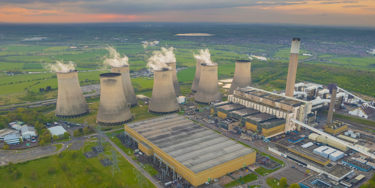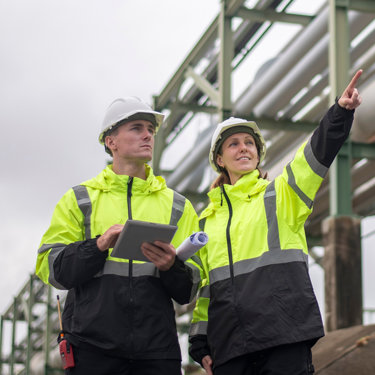A new dawn for energy as the last coal power station in UK closes
Published: 17 October 2024
The UK has witnessed a monumental shift in its energy landscape. The closure of Ratcliffe-on-Soar, the nation's last remaining coal-fired power station, marks the end of a 142-year era. This transition presents both challenges and opportunities which we are at the forefront of, by supporting businesses as they navigate this new landscape.

A century of coal
The UK’s industrial revolution was fuelled by coal, and it remained a dominant energy source for over a century. Coal-fired power stations were the backbone of the nation's electricity supply, powering homes, factories, and transportation networks. The coal industry supported countless jobs and communities across the country.
However, the environmental impact of coal is undeniable. The burning of coal released, and continues to release, significant amounts of greenhouse gases, contributing to climate change. Additionally, coal mining has had negative impacts on the environment, including land degradation and water pollution.
We have a long history in the UK energy sector, dating back to our origins as a coal merchant right up until the 70's, and as the energy landscape has evolved, so have we. We've adapted to the changing needs of the industry, expanding our services to include waste management, environmental remediation, and renewable energy.
The rise of renewables
The UK has made significant strides in transitioning to cleaner energy sources. Renewable energy, such as wind and solar power, has seen exponential growth in recent years. This shift has been driven by a combination of factors, including government policies, technological advancements, and increasing public awareness of climate change.
In 2023, renewable energy sources accounted for over 50% of the UK's electricity generation, a significant increase from just 7% in 2010. This growth has been driven primarily by the expansion of offshore wind power, which has become a major contributor to the UK's energy mix.
The UK government has set ambitious targets to further increase its renewable energy capacity. The government aims to generate 100% of the UK's electricity from renewable sources by 2035. To achieve this goal, and with the closure of traditional power stations, significant investments will need to be made in offshore wind, solar power, and other renewable technologies.
As the UK increases its reliance on renewable energy, energy storage will play a crucial role in ensuring grid stability. Battery energy storage systems (BESS) are becoming increasingly important in storing excess renewable energy during periods of low demand and releasing it during periods of high demand. This helps to balance supply and demand, reducing the need for fossil fuel-fired power plants.
The challenges of transition
While the transition away from coal is a positive step, it presents significant challenges. The intermittent nature of renewable energy sources, such as wind and solar, requires innovative solutions to ensure grid stability. Additionally, the closure of coal-fired power stations has proven to have economic and social impacts on communities that have traditionally relied on the fossil fuel industry.
Our role in the energy transition
We're committed to supporting businesses as they navigate this evolving energy landscape. Our expertise and experience in the energy sector enables us to provide tailored solutions to meet your needs.
Here’s how we can help your business integrate renewable energy into your operations, reduce your energy consumption and costs, and ensure a stable energy supply.
- Feasibility studies to assess suitability of renewable energy technologies
- Planning and execution of renewable energy projects
- Guidance and support in connecting renewable energy systems to the grid
- Ongoing maintenance of renewable energy systems
- Audits to identify where energy can be saved
- Help to identify and implement energy-efficient equipment
- Behavioural change programmes to promote energy-saving practices among staff
- Quantification of your carbon footprint and strategies to reduce it
- Assistance in selecting the right battery storage systems
- Optimising participation in demand response programmes
- Evaluating options for flexible energy contracts and negotiating favourable terms
The closure of Ratcliffe-on-Soar marks a turning point in the UK's energy history. As the nation embraces a cleaner, more sustainable future, Adler & Allan is committed to being a trusted partner for businesses. Our expertise, experience, and dedication to innovation enable us to deliver tailored solutions that meet the challenges and opportunities of the energy transition.
By working together, we can create a brighter future for the UK's energy landscape.
More from our Knowledge Hub
 Insights
InsightsEarth Day 2025: Enabling a sustainable future while supporting today’s infrastructure in an evolving energy landscape
 Insights
InsightsMitigating climate change risks through planned preventive maintenance
 Insights
InsightsProtective coatings: Safeguarding infrastructure against climate change
 Insights
InsightsDelivering the Water (Special Measures) Act: Supporting compliance and innovation
Environmental compliance today, creating a sustainable tomorrow
Helping you reduce risk to the environment and your operation by managing assets compliantly while achieving commercial, ESG, and net-zero goals.
Contact our experts
